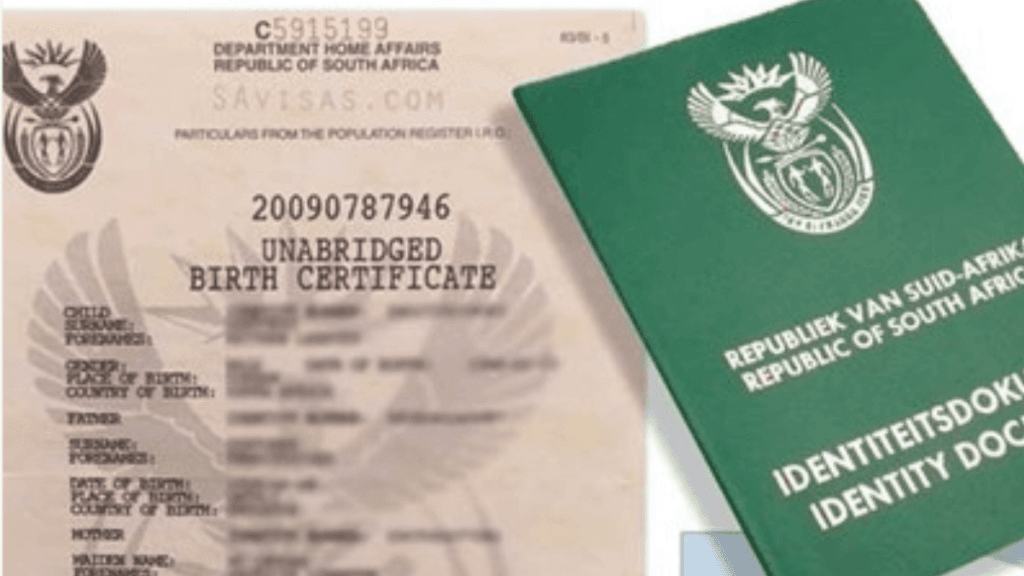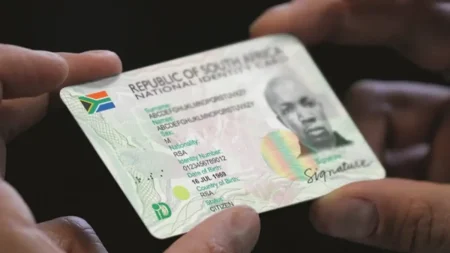In recent years, South Africa’s green ID books have come under scrutiny due to their vulnerability to identity theft and fraud. These traditional ID books, introduced in 1980, were once a reliable means of identification but have become a weak link in the fight against crime in a digital world.
As identity theft rises across South Africa, the Department of Home Affairs is actively urging citizens to upgrade to Smart ID cards to improve personal security and reduce fraudulent activities.
Why Green ID Books Pose a Security Threat
South Africa’s green ID book, designed decades ago, lacks many of the security measures needed to combat today’s sophisticated forms of identity theft. With minimal features to prevent tampering or counterfeiting, green ID books can easily be altered, duplicated, or misused.
Criminals can obtain false IDs by altering information within the green ID book, allowing them to impersonate others, obtain fraudulent credit, and access restricted services.
1. Vulnerability to Identity Theft
The South African government has identified green ID books as high-risk documents in terms of identity theft. With only basic identification features, these books can be physically altered or cloned by fraudsters. This lack of advanced security allows criminals to access financial services, healthcare, and social grants by using stolen or falsified IDs.
2. High Fraud Rates Linked to Green ID Books
A 2024 report by Smile ID on Digital Identity Fraud in Africa revealed that South Africa’s green ID books have a fraud rate of 34%—the highest in Africa. By contrast, driver’s licenses have a fraud rate of 14%, while national IDs from other African countries are targeted only 7% of the time. This high fraud rate not only places a heavy financial burden on individuals but also on the South African government, which is forced to combat fraudulent activities at multiple levels.
3. Susceptibility to Physical Damage
Green ID books are made from paper and are prone to physical wear and tear, which makes them vulnerable to damage over time. This not only shortens the lifespan of the document but also creates more opportunities for fraud, as damaged ID books are easier to tamper with. In contrast, Smart IDs are designed to withstand wear and tear, adding to their durability and security.
4. Increased Risk of ID Number Hijacking
Due to the limited security features, criminals find it easier to hijack ID numbers from green ID books. This type of fraud allows them to use someone else’s identity to open credit accounts, take out loans, and make unauthorized transactions, leaving the legitimate ID holder with potential financial consequences and a long process to restore their credit standing.
The Solution: Smart ID Cards
To address these issues, the South African Department of Home Affairs launched an initiative in August 2024 to phase out green ID books and encourage citizens to transition to Smart ID cards. These cards incorporate modern security features that make them a more robust form of identification.
1. Biometric Security Features
Smart ID cards come equipped with a biometric chip, which stores data that uniquely identifies the cardholder. Unlike the green ID book, which relies solely on visual inspection, the Smart ID’s biometric chip uses fingerprint verification to authenticate the individual. This chip makes duplication or counterfeiting nearly impossible, providing an additional layer of security.
2. Laser-Engraved Personal Information
The details on a Smart ID card are laser-engraved, which makes it extremely difficult to tamper with or forge. Laser engraving is a significant deterrent against fraud because it ensures that any attempt to alter the information on the card would be visibly apparent. According to Deputy Minister Njabulo Nzuza, this feature makes Smart IDs exceptionally challenging to duplicate, making them a safer alternative to the traditional green ID book.
3. Digital Verification Compatibility
Smart IDs are compatible with digital verification systems, allowing for faster and more reliable identity verification. This feature reduces the need for in-person verification, which not only improves convenience for the cardholder but also enhances security by minimizing the risk of ID theft during in-person verification processes. Smart IDs are increasingly being integrated into digital platforms, allowing banks, government services, and businesses to verify identities quickly and securely.
4. Durability and Longevity
Smart ID cards are crafted from durable materials, ensuring they remain intact and legible even after years of use. This durability reduces the need for frequent replacements and prevents issues related to wear and tear that can compromise the security of green ID books.
5. Reduced Fraud Rates and Enhanced Trust
With the introduction of Smart IDs, the rate of fraud in identity verification processes is expected to decrease substantially. The biometric and laser-engraved features provide peace of mind to businesses and institutions by ensuring that the person presenting the ID is indeed who they claim to be. This shift to Smart IDs has the potential to build greater trust between South Africans and institutions that require identification, fostering a safer environment for all.
How to Upgrade from a Green ID Book to a Smart ID
Upgrading from a green ID book to a Smart ID is straightforward, with various facilities available to assist South Africans in making the switch. Since the launch of the initiative, the Department of Home Affairs has issued 26 million Smart ID cards and has a target of reaching 38 million by the end of the transition phase.
1. Visit a Home Affairs Office or Bank Branch
Citizens can apply for a Smart ID at any Home Affairs office or one of the 30 partnered bank branches that offer ID services. By partnering with banks, the Department of Home Affairs has made it more convenient for individuals to access these services.
2. Mobile Units and Kiosks
To facilitate the transition, 227 mobile units have been deployed across the country, especially in rural and underserved areas, to bring Smart ID services directly to the people. Plans are also in place to roll out self-service kiosks, similar to ATMs, which will further streamline the application process and make it easier for citizens to obtain their Smart ID.
3. Application Process
To apply, South Africans will need to present their green ID book, submit biometric data (such as fingerprints), and pay a nominal fee. The Smart ID card will be processed and issued within a few weeks, giving individuals a much more secure form of identification.
4. Age Requirements and First-Time Applicants
The Department of Home Affairs has implemented special provisions for individuals under 16 and those who have never applied for an ID before. For first-time applicants, the process is simplified, and in some cases, fees may be waived to encourage young people to obtain a secure form of identification early on.
Tip: Simplified Smart ID Online Application: Your Guide to eHomeAffairs
Why Upgrading to a Smart ID is Essential
With the escalating threat of identity theft and fraud, moving from a green ID book to a Smart ID is more than just an upgrade—it’s a necessary step in protecting oneself in a digital age. Smart IDs provide enhanced security, better durability, and easier integration into digital systems, helping citizens to safeguard their identities and reduce the risk of falling victim to fraud.
Secure Your Future: Make the Switch Today
The Department of Home Affairs is strongly encouraging all South Africans still using green ID books to switch to Smart IDs. This new form of identification is not only designed to protect personal data but also represents a step forward in modernizing South Africa’s approach to identity management.
By upgrading to a Smart ID, you’re investing in a more secure future. With a Smart ID, you gain access to a more reliable, convenient, and fraud-resistant identification system that integrates seamlessly into both physical and digital environments. Don’t wait until it’s too late—make the switch today to protect your identity and secure your future.










